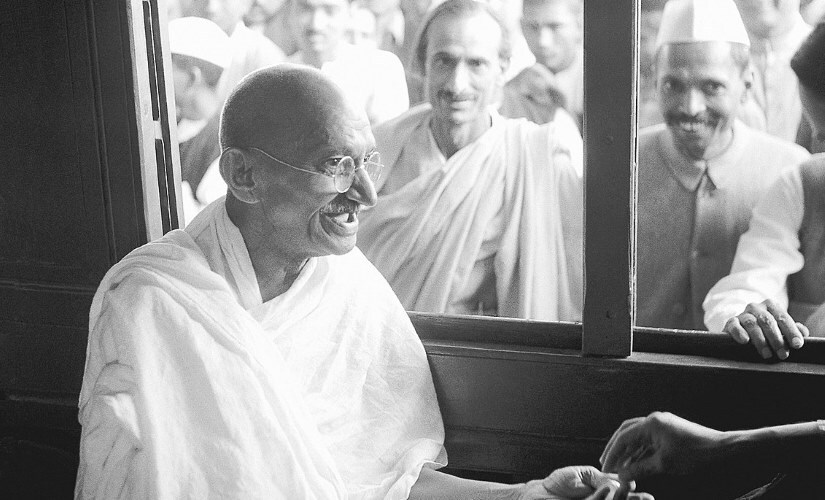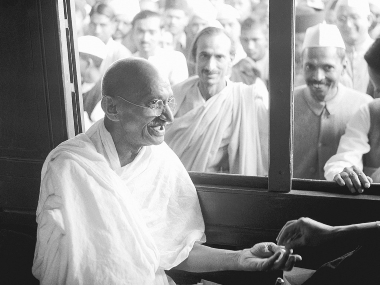One hundred and fifty years after he was born on 2 October, 1869, Mohandas ‘Mahatma’ Gandhi is still an elusive miracle. To make such a claim of invisibility for a figure so hyper-visible may, at first, be ridiculous. Gandhi is, after all, the patrimonial icon of the Indian nation and the symbolic embodiment of its extensive international purchase. Despite perfunctory disaffections that emerge from time to time, he is a figure of unquestioned reverence; seventy years after his death, there have been one too many occasions when we have, as a people lost and broken, desired to turn to the spiritual and political resources of this one man who refuses to be forgotten. But Gandhi, to repeat the provocative claim of this piece, is elusive – he has already been forgotten. The “unquestioned reverence” that follows our “perfunctory disaffections” attests his precarious position as a figure too frozen to have anything meaningful to say; we prostate because we do not care. Like an efficacious, haunting curse, BR Ambedkar’s warning has indeed come to pass – Gandhi is an unreachable Mahatma, and “history tells us that Mahatmas, like fleeting phantoms, raise dust but no level.” [caption id=“attachment_7439651” align=“alignnone” width=“825”]  Mohandas Gandhi. Image via WikimediaCommons[/caption] The greatest lesson of history, if any, is that nothing is as immemorial as it appears. It has been possible to freeze Gandhi only by an extensive historical process that has singled him out as a lonely miracle. With avowed reverence and little recalcitrance, we have followed. Miracle inflects the historical record at many levels and in many registers. In the writings of colonial officials either witnessing the explosive flourishes of a Gandhian movement or commenting on it from a safely situated retrospective gaze, colonialism was enlightened foreign rule that, whenever resisted, owed less to sincere grievance and much more to the artful intercessions of deceitful players – like Gandhi – activating local and parochial solidarities. But even as Gandhi remained for British luminaries as Winston Churchill scarcely more than a ‘half-naked seditious faqir,’ officials lodged in the thick of Gandhian affairs like the Civil Disobedience Movement (1930) often noted Gandhi’s hypnotic effect on the mobilised masses with curious incredulity. Here was a man – a former barrister now turned ascetic-politician – mobilising nearly incalculable droves and creating, by his mere presence, a potent anti-colonial theatre of global reach and acknowledgement. What was this if not a miracle? Its incredulity may have dulled, but this is certainly a sentiment the nationalists carried. Although decades of scholarship have turned the “incalculable droves” of Gandhian movements into ‘subalterns’ who harnessed Gandhi’s seemingly procrustean message to their plural ends, Gandhi’s almost magical appeal has been shown to be undeniable. In a perceptive essay mindful of this qualification, Shahid Amin has sketched the affective ways by which Gandhi became Mahatma. Gandhi’s dicta were interpreted and used heterogeneously, but all such interpretations, Amin shows at least for Gorakhpur, were bound by the nebulous adhesive of bhakti that, when propelled, could be made to inspire action. Thus, Gandhi was crafted in saintliness and his saintliness then tested, affirmed, and assiduously circulated by rumour. Rumours held the key to this incipient sainthood – those opposing Gandhi in matters of diet and consumption (liquor, tobacco) were said to suffer inexplicably excruciating wrongs; those who ‘followed’ and especially vowed to were, by the Mahatma’s munificence and miracle-working, reportedly granted boons and facilitative miracles. With the power to grant miracles and inflict retributive punishment with divine panache, the miraculous comes to be vested in the body of the Mahatma – in other words, he is the miracle. The end of Gandhi’s body – his murder at the hands of Nathuram Godse – was not the end of the miracle. At the cusp of postcolonial nationhood, Gandhi’s position as an anomaly had to be rearticulated. Leela Gandhi (incidentally, his great-granddaughter) has so argued that although Godse pulls the trigger and ends Gandhi’s body, Jawaharlal Nehru too, albeit in very different hues, ‘ends’ his overpowering figure. However different, both men view Gandhi as aberrational ‘excess’ whose end is needed for real politics to begin. For Godse, this politics was the reign of the Hindu over the Muslim and, by extension, of India over Pakistan. For Nehru, it was the suppression of Gandhi’s well-intentioned but ultimately misguided idealism and the beginning of practical statecraft as such. Over seventy years of political experience since have shown who among the two was misguided, but Gandhi remains as independence left him – a consecrated miracle impossible to access, let alone replicate; everywhere, but nowhere. On his birthday and one-fifty years after him, righting this wrong is only historical justice. The act of addressing our postcolonial predicaments begins, perhaps, by reclaiming Mohandas Gandhi as a miracle residing within our own selves and waiting, at the first call of conscience, to be seized.
Gandhi remains as independence left him – a consecrated miracle impossible to access, let alone replicate; everywhere, but nowhere.
Advertisement
End of Article


)
)
)
)
)
)
)
)
)



